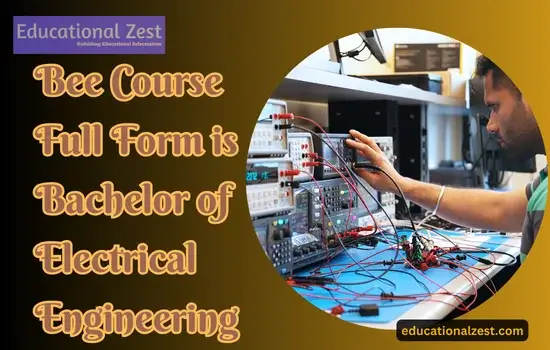The Bee Course Full Form is Bachelor of Electrical Engineering. BEE, which stands for Bachelor of Electrical Engineering, delves into the intricate domains of electrics, electronics, electromagnetics, mathematics, thermal power plants, hydro-electric plant models, electric power, electric energy systems, and control. This undergraduate degree program spans four years, preparing students for a dynamic career in the expansive field of electrical engineering. To gain admission to BEE, aspiring students must have completed their 10+2 in the Science stream with Physics, Chemistry, and Mathematics. Additionally, they need to appear for various entrance examinations conducted by National and State-level Testing Agencies.

What the course is about
Electrical engineers study electrics, electronics, electromagnetics, mathematics, thermal power plants, hydroelectric plant models, power, and control systems. Students study electric equipment theory and practice throughout four years. Bachelor in Electrical Engineering opens doors to careers, further studies, and research. Graduates’ theoretical and practical skills make them valuable in electrical engineering’s ever-changing field. BEE’s bright future and generous pay attract electrics and electronics aficionados.
Eligibility Criteria:
BE in Electrical Engineering qualifying requirements:
- Passed 12th grade science with Physics, Chemistry, and Math with 75% (65% for SC/ST).
- Qualification in JEE Mains and JEE Advanced for engineering college admission.
- IITs, NITs, and universities and institutions undergo JoSAA (Joint Seat Allocation Authority) counseling and personal interviews.
- Verifying documents and meeting institution cut-offs.
- Institution-specific qualifying requirements.
Future Scope
Bachelor’s in Electrical Engineering graduates thrive. The training teaches theoretical and practical skills for power plant research and development. Graduates can design, build, test, and upgrade electrical instruments.
Diverse Job Opportunities: Graduates may become electrical, power project, design, electronics, or instrumentation engineers.
Skill Enhancement: Student skill development includes equipment usage, data analysis, signal processing, and project planning.
Quality Assurance: Graduates may work as Quality Engineers to assure product safety and technical compliance.
Electro-Mechanical Engineering: Contractor-based equipment installation, inquiry, and data analysis for customer design concepts.
Passing the Graduate Aptitude Test in Engineering lets BE Electrical Engineering graduates get M.E. or M.Tech. They may then do Ph.D. and post-doctoral research on the same issue, furthering the field.
Salary
Typical job descriptions and incomes for BEE graduates include designing, maintaining, installing, and improving electrical equipment. The average yearly salary is INR 3,65,993.
Junior Electrical Engineer: Contract drawings, equipment operation, and repair crew supervision. Average yearly wage: INR 4,78,000.
Electrical Testing Engineer: Test electrical systems and create new goods. INR 2,72,868 average yearly salary.
Product Engineer: Commercial product development coordination. Average yearly salary: INR 3,50,000.
Quality Engineer: Testing product safety and technology. Average yearly salary: INR 3,60,000.
Electro-Mechanical Engineer: Electro-mechanical engineers install, study, and evaluate equipment alongside contractors. Average yearly salary: INR 10,56,394.